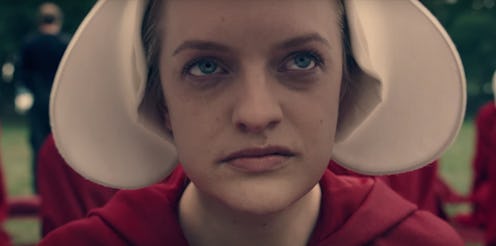Entertainment
Here's How The 2018 Golden Globes Have Embraced Stories About Women Survivors Post-Weinstein

While 2017 has become a year of reckoning for an industry inundated with sexual assault allegations, it has also been a year of strong women on television, and the Golden Globes noticed. On Monday, the Golden Globes nominated TV shows about women survivors for multiple awards. Several TV series centered around women living through sexual assault and domestic abuse like Big Little Lies and Handmaid's Tale were recognized by the Hollywood Foreign Press Association (HFPA), the body behind the Golden Globes, with several nods each. Meanwhile, veteran award-show favorites with lead actors accused of sexual misconduct (Kevin Spacey in House of Cards, and Jeffrey Tambor in Transparent) were not nominated.
Though it's impossible to say for certain if the nods and snubs were a purposeful reflection on the #MeToo movement and the dozens of women and men who have stepped forward with their stories of sexual harassment and assault of movie and television sets, it is clear that the HFPA, like many audience members and critics, was impressed by the television series addressing these systematic issues.
And, really, it's about time that stories that address issues like domestic abuse and sexual violence, which disproportionately affect women, were given their due. Spoilers are ahead for the first season of Big Little Lies, The Handmaid's Tale and 13 Reasons Why.
Let's start with Big Little Lies, the HBO series about the power of female friendships that also received a whomping six Golden Globe nominations, the most any television series got this year.
Big Little Lies follows a group of mothers who have children in the same class. As the show unfolds we learn that one of the women, played by Nicole Kidman, is living with a violent, abusive husband (Alexander Skarsgård), while another mom, played by Shailene Woodley, is a rape survivor (also by Skarsgård) and is raising the child who was conceived during the assault. By the end of the season, these two survivors come together, with the help of the other women, to confront their mutual assaulter. The performances, which never shy away from the realities of motherhood or the trauma of sexual and physical violence, were recognized by the Globes. Kidman and Reese Witherspoon were both nominated for Best Performance by an Actress in a Mini-series, while Woodley and Laura Dern were nominated for Best Supporting Actress.
The nomination of four separate actresses from the mini-series reflects the emphasis on women relating to and supporting other women. Unlike other narratives that might feature a woman finding strength solely in herself, Big Little Lies celebrates women helping and supporting other women. This focus on how women relate to each other and support one another through tough times is a trait shared by Hulu's The Handmaid's Tale, which is also nominated for multiple Golden Globe trophies.
The Handmaid's Tale received three nominations and features a fictional world in which women are stripped of their basic rights. The handmaids at the heart of the story are forced to take part in a religious ceremony that involves a man, called their commander, having sex with them at the time of ovulation as the commander's wife watches. The handmaids do not consent to this act and they are forced into it by the government. They need to conceive a child or else they face a penalty of extreme violence, such as the removal of an eye or hand, or state execution. We follow Offred (Elisabeth Moss) as she suffers through the ritual and other violence, while she tries desperately to survive, physically and spiritually, for the chance to reunite with her family and to escape. Along the way she is empowered by other women struggling in the society, but also oppressed by those who benefit from the patriarchy.
It's an extreme, dystopian version of our culture, but one that serves as a warning and a reminder, of what can happen when women are left without agency over their own bodies.
Of course, tragically, not all women or men who are subjugated to sexual violence are able to overcome their trauma. In another Golden Globe-nominated performance, Katherine Langford as teenager Hannah Baker in 13 Reasons Why, fell into a deep depression and killed herself following being raped by a classmate and bullying by other classmates. The story helped bring a conversation to many young fans about issues revolving around mental health and the effects of rape culture.
As USA Today points out, the Golden Globes also recognized several other performances by women playing characters who stood up to the patriarchy and a culture that asked them to be complacent or docile: There's Rachel Brosnahan playing a stand-up comedian in the 1950s with The Marvelous Mrs. Maisel, Maggie Gyllenhaal's '70s sex worker in The Deuce, and Alison Brie as a female wrestler in the '80s in Glow. These strong female roles fight to overcome cultures that systematically undermine them in their respective TV series.
Hopefully with the critical success of these programs, and the additional Golden Globes bump, Hollywood will continue green-lighting series and movies that tell stories of women's empowerment and survival. If there's anything that the #MeToo movement might teach us, it's that sharing our experiences can make survivors feel less alone, and can encourage us to make efforts to change society.